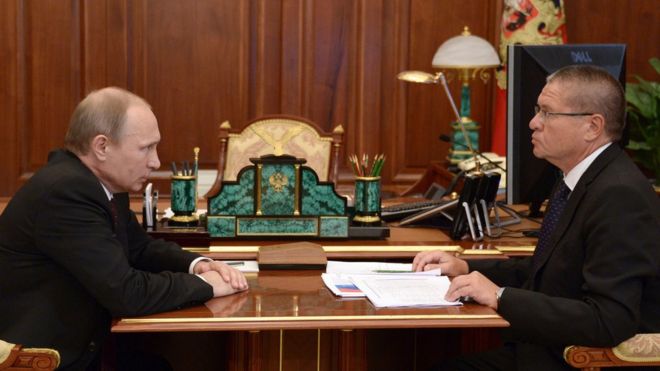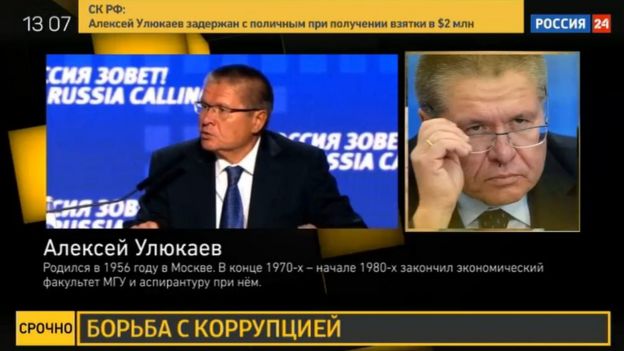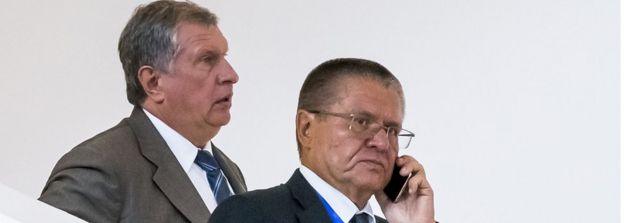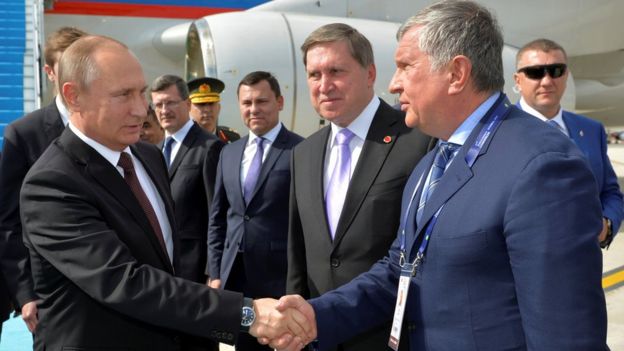
Russia’s Economy Minister Alexei Ulyukayev has been accused of taking a bribe to endorse a state takeover.
Russia’s main anti-corruption body, the Investigative Committee (SK), said he received a payment of $2m (£1.6m).
Mr Ulyukayev is the highest-ranking Russian official held since the 1991 coup attempt in what was then the USSR.
The SK said he had “threatened” to create obstacles for Rosneft’s operations when it took a 50% stake in another state oil company, Bashneft.
According to SK spokeswoman Svetlana Petrenko, “Ulyukayev was caught red-handed”, receiving a $2m bribe on 14 November for giving a favourable assessment of the Rosneft deal. Investigators asked the courts to place him under house arrest, Interfax reported.
‘Strange’ arrest
The apparent sting operation came after months of electronic surveillance, including phone-tapping, officials said. Unconfirmed reports said the internal FSB security service had run the entire operation.
 Alexei Ulyukayev’s arrest was headline news on state-run TV, with the strapline “Battle against corruption”
Alexei Ulyukayev’s arrest was headline news on state-run TV, with the strapline “Battle against corruption”The arrest was big news on Russia’s state-run TV channels.
However, sources told the Novaya Gazeta website that Mr Ulyukayev himself didn’t take any money, contradicting earlier reports, and there was no video footage of his arrest.
The economy ministry described the arrest as “strange and surprising”.
Who’s gaining from this?
Alexander Shokhin, the head of the Russian union of industrialists and entrepreneurs, told Russian radio he had serious doubts about the arrest.
“You would have to be insane, a month after the deal got legal and political approval, to threaten Rosneft and extort $2 million from [Rosneft Chief Executive] Igor Ivanovich Sechin, who is actually one of the most influential people in this country.
 File pic of Rosneft Chief Executive Igor Sechin (L) with Alexei Ulyukayev in August
File pic of Rosneft Chief Executive Igor Sechin (L) with Alexei Ulyukayev in August“You have to think Ulyukaev has spent 25 years in politics and they’re portraying him like some kid who acts in that field like a complete novice.
“It’s hard to tell who’s actually gaining from all this, apart from the SK which is diverting attention away from their generals who are being investigated.”
If found guilty, Mr Ulyukayev, 60, could face a prison sentence of between eight and 15 years.
An economic liberal in the 1990s, he became deputy chairman of Russia’s central bank in 2004. He was appointed economy minister in 2013.
A very strange privatisation
It was only in October that Rosneft, an oil giant controlled by the Russian government, bought 50% of Bashneft for 330bn roubles ($5bn). Bashneft itself was one of Russia’s largest state oil companies.
Russia is in the middle of an economic slump, largely because of the fall in crude oil prices, and had lined up several state companies for privatisation to replenish state coffers.
 Rosneft’s success in taking over Bashneft was seen as a victory for Chief Executive Igor Sechin (R)
Rosneft’s success in taking over Bashneft was seen as a victory for Chief Executive Igor Sechin (R)But the sell-off of Bashneft had been shelved in August, reportedly by the Kremlin because of a dispute over who would take it over.
The controversial privatisation returned to the agenda early last month, apparently because of the government’s need to raise money. Mr Ulyukayev promised last month that the entire sum paid by Rosneft would go to the Russian budget.
Economic liberals had fiercely opposed the idea of a state-owned company acquiring the government’s share in another state oil firm. It was seen as a victory for Rosneft’s chief executive, Igor Sechin, who has long been a close adviser to President Vladimir Putin.
The president said last month that he had been “rather surprised” by the government’s earlier position to delay the deal as Rosneft was “strictly speaking” not a state firm as part of it was owned by BP.
A Rosneft spokesperson told the Tass news agency it acquired the Bashneft stake “in accordance with Russian law, on the basis of the best commercial offer made to the operating bank”. Mikhail Leontyev told Russian TV later that “there cannot be any threat of cancelling the deal”.
Bashneft was itself taken over controversially by the Russian state when its owner Vladimir Yevtushenkov was arrested. Charges against him were later dropped.